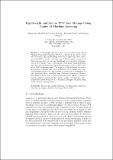| dc.contributor.author | Yu, Meng-Day (Mandel) | |
| dc.contributor.author | M’Raihi, David | |
| dc.contributor.author | Sowell, Richard | |
| dc.contributor.author | Devadas, Srinivas | |
| dc.date.accessioned | 2012-10-10T18:38:19Z | |
| dc.date.available | 2012-10-10T18:38:19Z | |
| dc.date.issued | 2011-09 | |
| dc.date.submitted | 2011-10 | |
| dc.identifier.isbn | 978-3-642-23950-2 | |
| dc.identifier.issn | 0302-9743 | |
| dc.identifier.issn | 1611-3349 | |
| dc.identifier.uri | http://hdl.handle.net/1721.1/73862 | |
| dc.description | 13th International Workshop, Nara, Japan, September 28 – October 1, 2011. Proceedings | en_US |
| dc.description.abstract | A lightweight and secure key storage scheme using silicon Physical Unclonable Functions (PUFs) is described. To derive stable PUF bits from chip manufacturing variations, a lightweight error correction code (ECC) encoder / decoder is used. With a register count of 69, this codec core does not use any traditional error correction techniques and is 75% smaller than a previous provably secure implementation, and yet achieves robust environmental performance in 65nm FPGA and 0.13μ ASIC implementations. The security of the syndrome bits uses a new security argument that relies on what cannot be learned from a machine learning perspective. The number of Leaked Bits is determined for each Syndrome Word, reducible using Syndrome Distribution Shaping. The design is secure from a min-entropy standpoint against a machine-learning-equipped adversary that, given a ceiling of leaked bits, has a classification error bounded by ε. Numerical examples are given using latest machine learning results. | en_US |
| dc.language.iso | en_US | |
| dc.publisher | Springer Berlin / Heidelberg | en_US |
| dc.relation.isversionof | http://dx.doi.org/10.1007/978-3-642-23951-9_24 | en_US |
| dc.rights | Creative Commons Attribution-Noncommercial-Share Alike 3.0 | en_US |
| dc.rights.uri | http://creativecommons.org/licenses/by-nc-sa/3.0/ | en_US |
| dc.source | MIT web domain | en_US |
| dc.title | Lightweight and secure PUF key storage using limits of machine learning | en_US |
| dc.type | Article | en_US |
| dc.identifier.citation | Yu, Meng-Day et al. “Lightweight and Secure PUF Key Storage Using Limits of Machine Learning.” Cryptographic Hardware and Embedded Systems – CHES 2011. Ed. Bart Preneel & Tsuyoshi Takagi. LNCS Vol. 6917. Berlin, Heidelberg: Springer Berlin Heidelberg, 2011. 358–373. | en_US |
| dc.contributor.department | Massachusetts Institute of Technology. Department of Electrical Engineering and Computer Science | en_US |
| dc.contributor.mitauthor | Devadas, Srinivas | |
| dc.relation.journal | Cryptographic Hardware and Embedded Systems – CHES 2011 | en_US |
| dc.eprint.version | Author's final manuscript | en_US |
| dc.type.uri | http://purl.org/eprint/type/ConferencePaper | en_US |
| dspace.orderedauthors | Yu, Meng-Day; M’Raihi, David; Sowell, Richard; Devadas, Srinivas | en |
| dc.identifier.orcid | https://orcid.org/0000-0001-8253-7714 | |
| mit.license | OPEN_ACCESS_POLICY | en_US |
| mit.metadata.status | Complete | |
